- Home


- About
- Reports
- Academics
- PhD
- B.B.A.
- Students
- Faculty
- Research
- Library
- Alumni
- IQAC
- Extension
- Events
For the month of September, students completed a Value Added Course on Personal and Professional Development for Teachers. The Course had 14 units covered over 7 days. Each day had an instructional video for 2 units followed by a google form assessment. Students also had to opt for 3 essays from the topics given which covered the essence of the Value Added Course. Students completed it at their own pace over the course of the month.
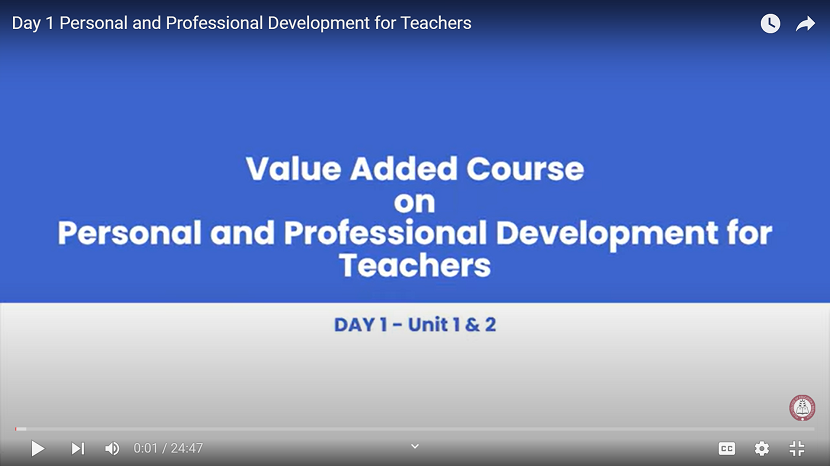
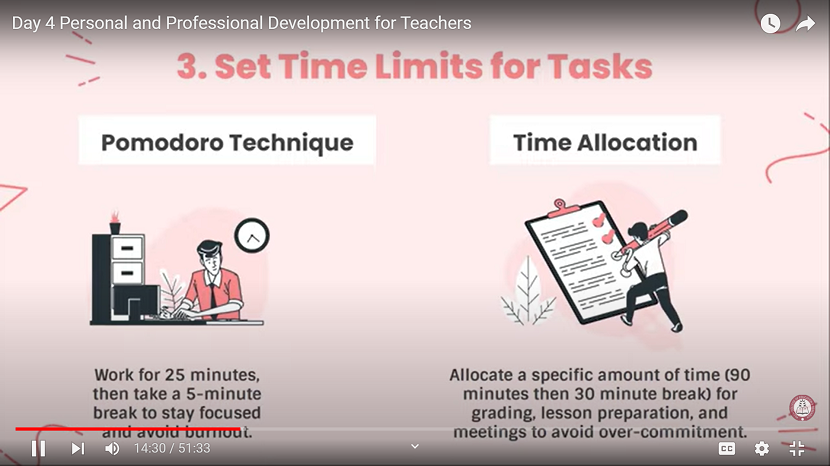






















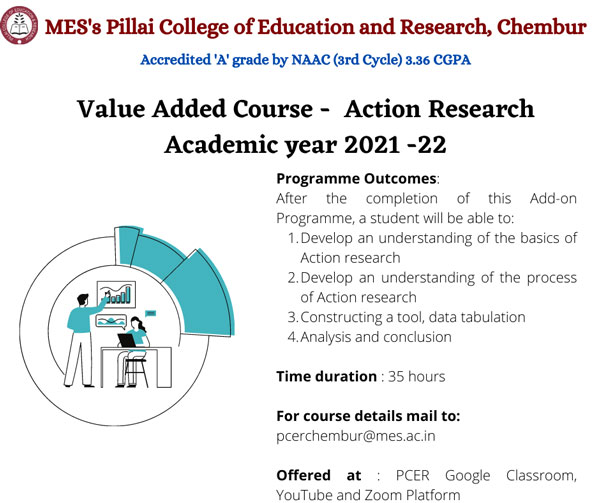
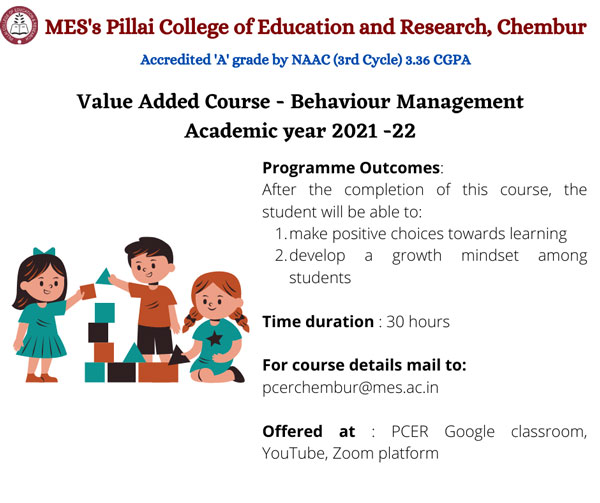
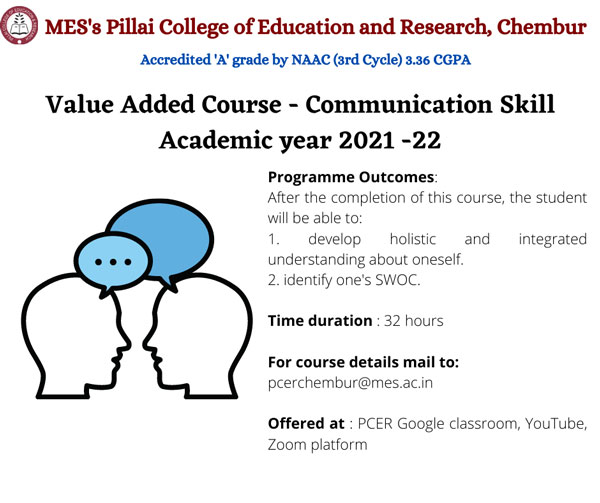
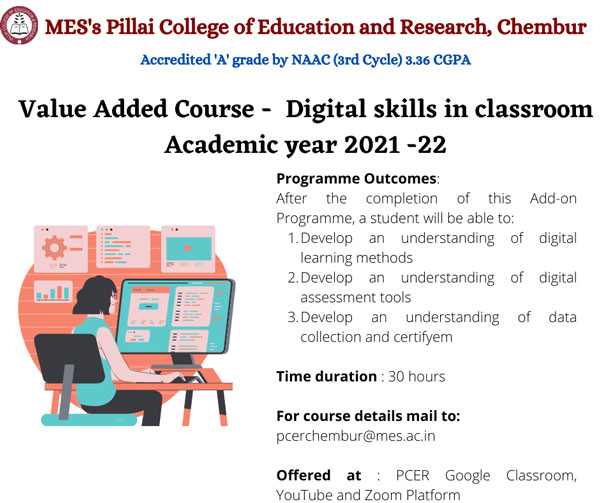
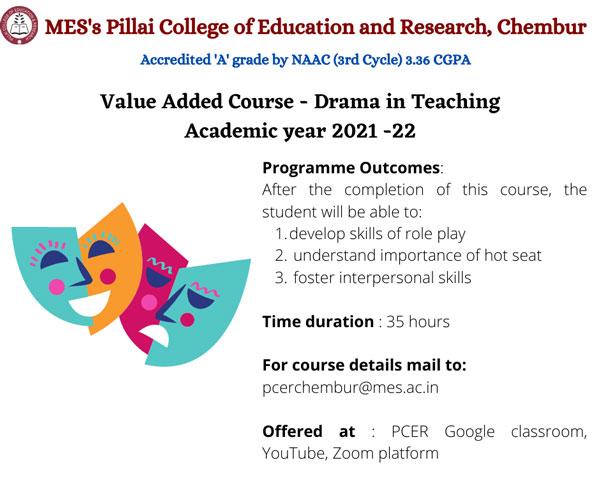
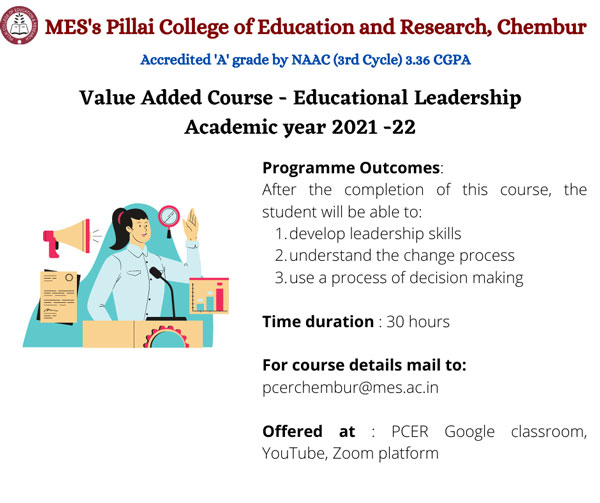
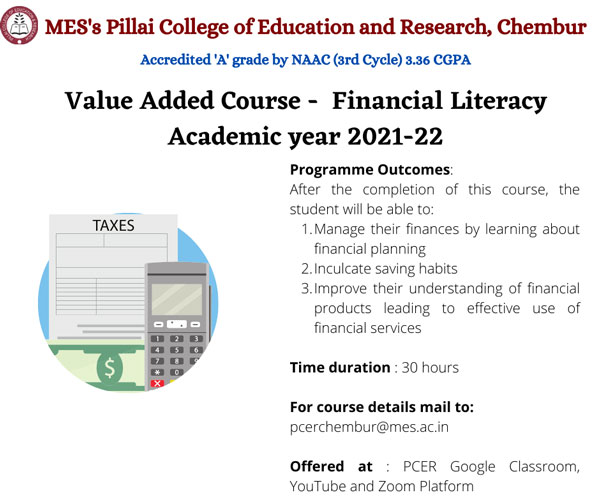
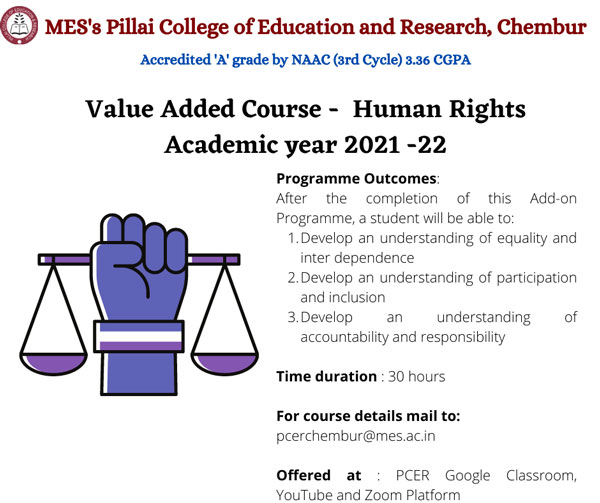
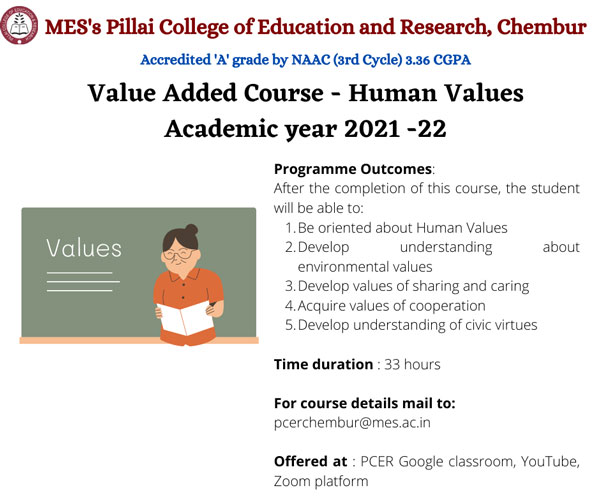
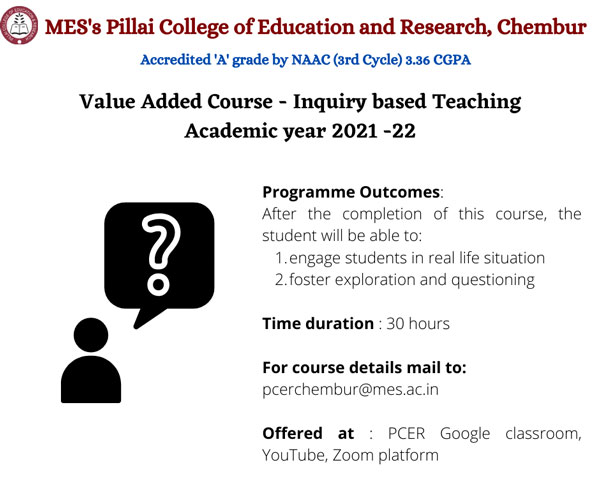
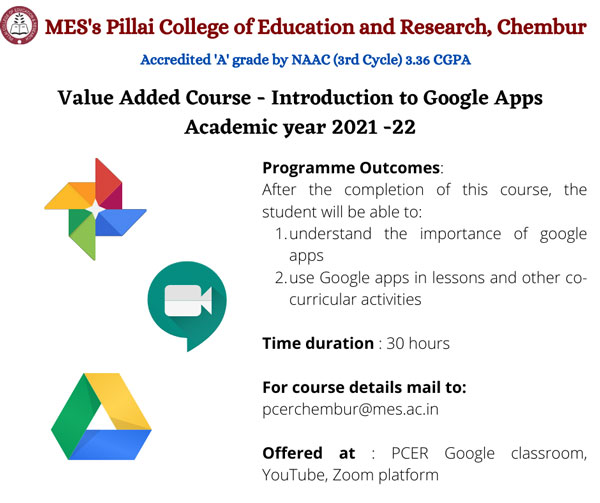
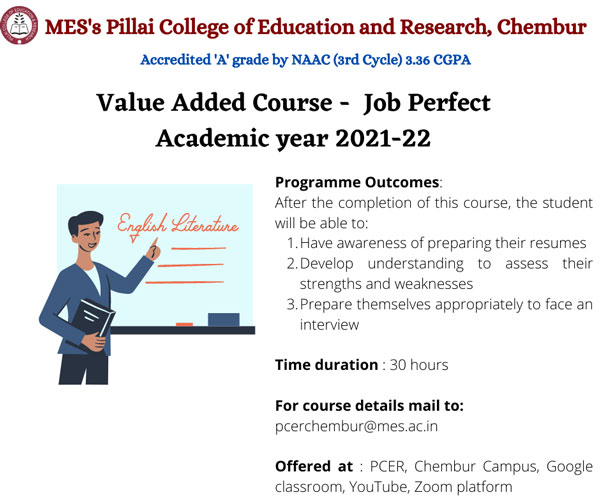
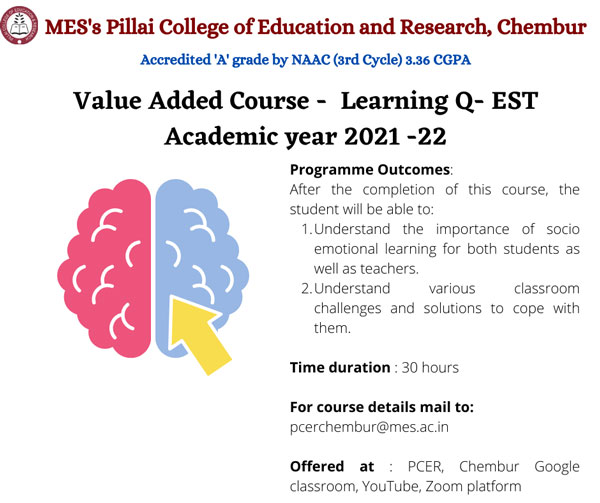
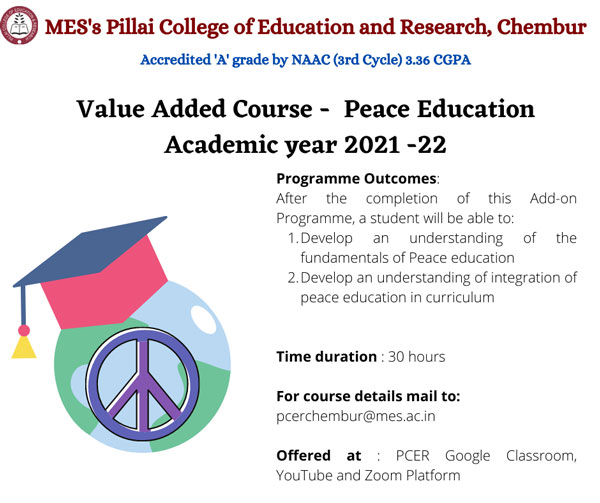
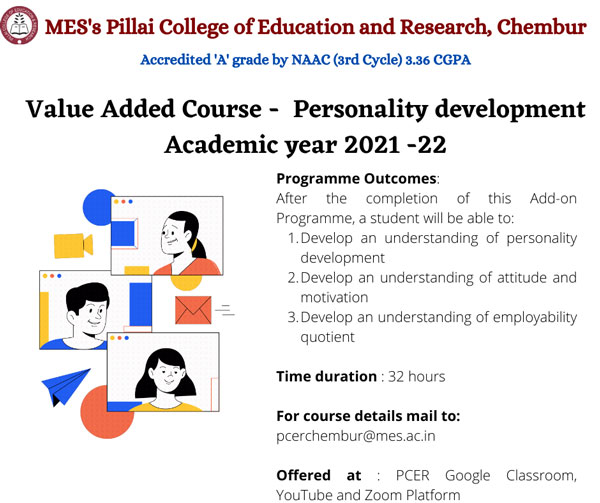
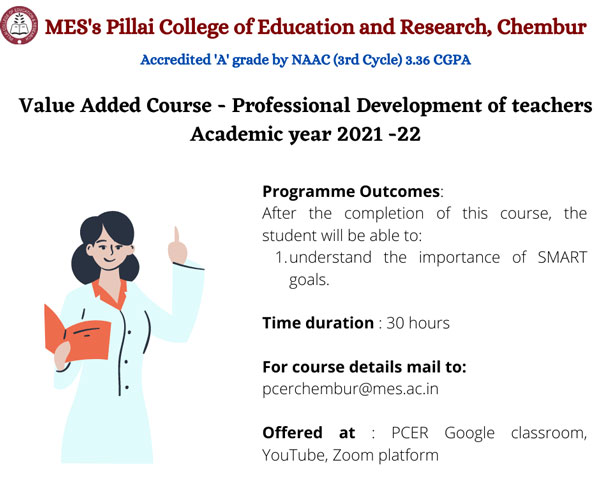
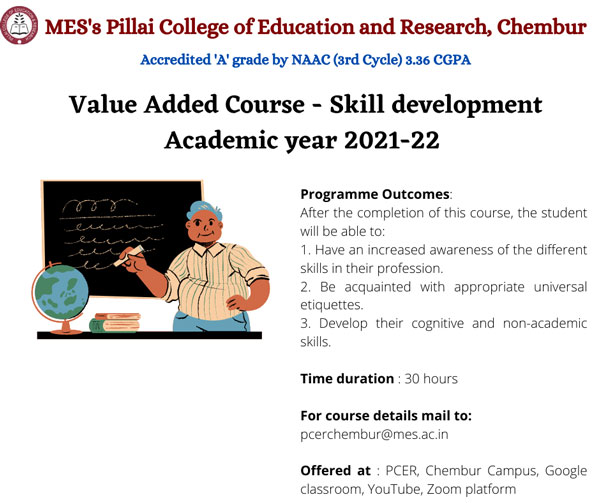
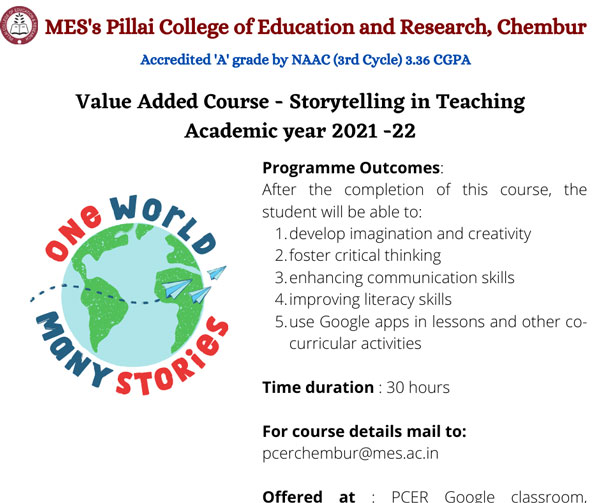
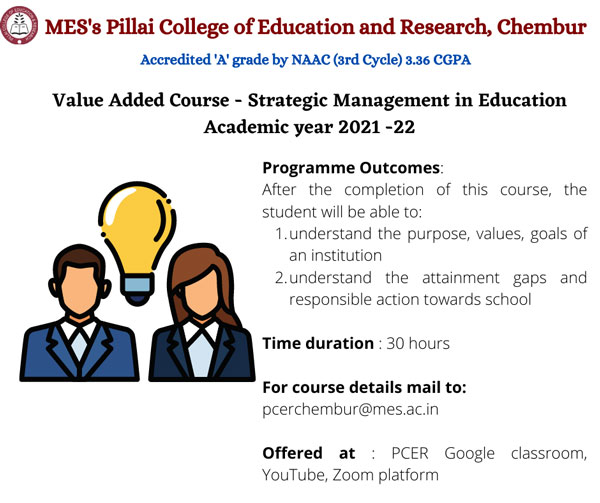
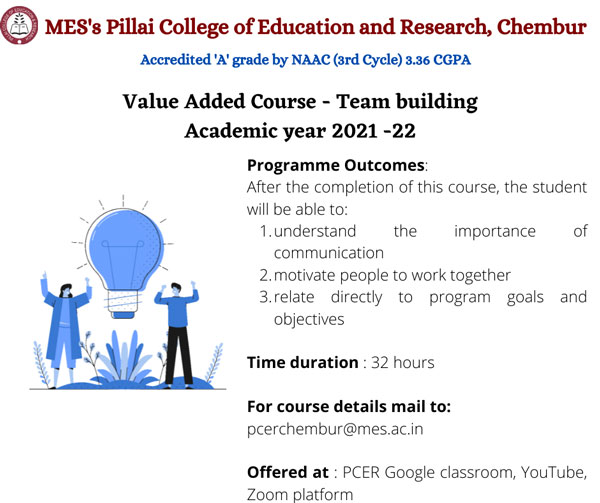
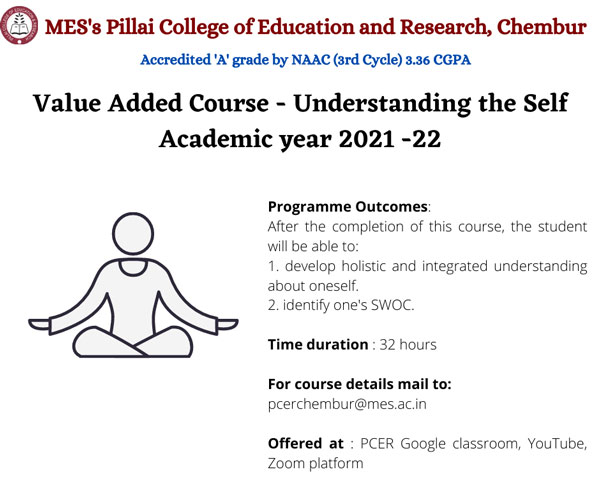
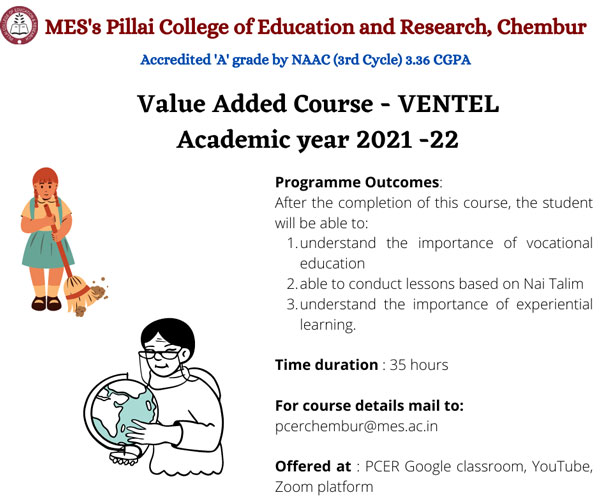
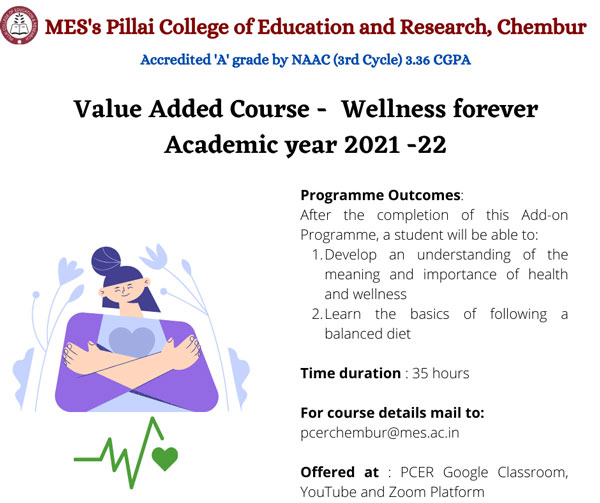
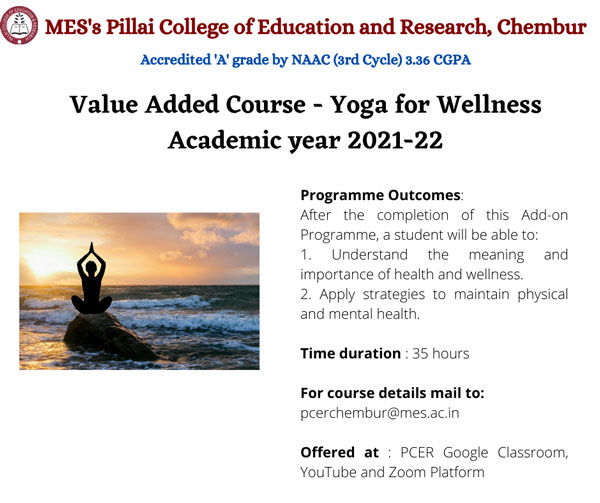
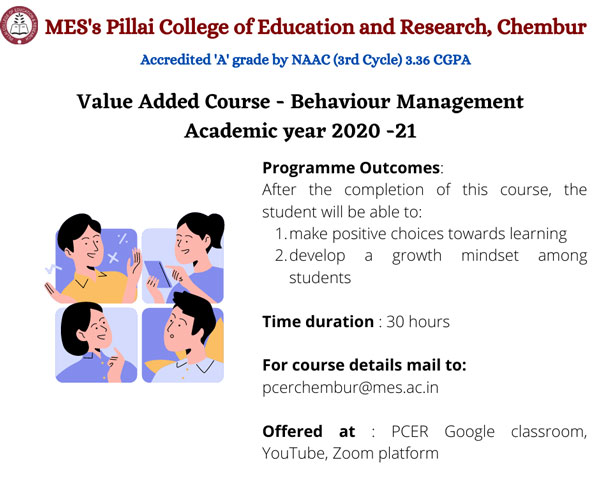
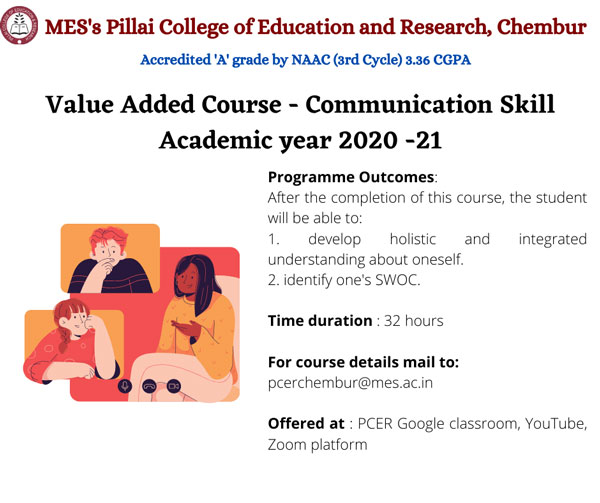
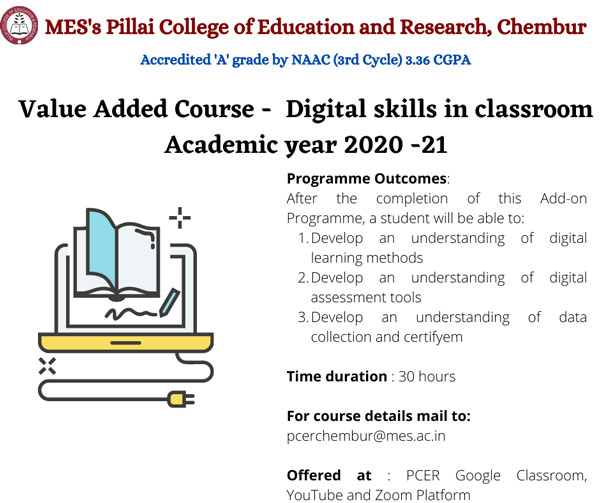
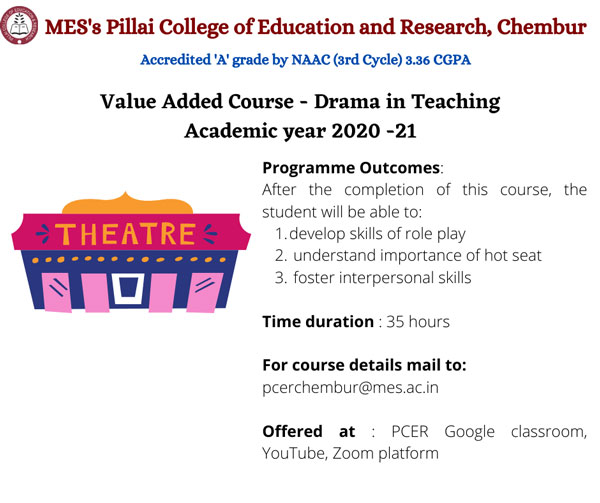
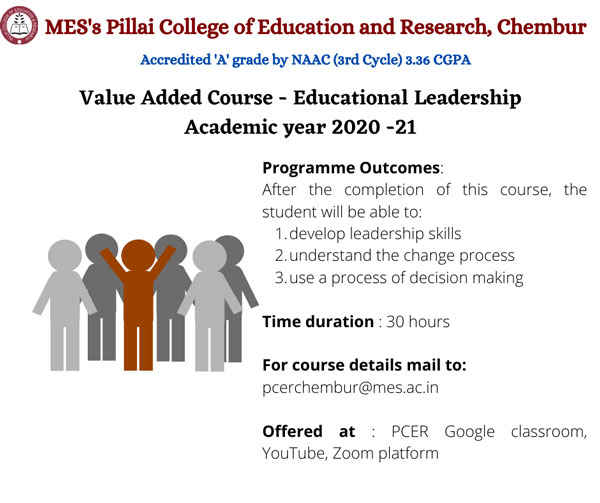
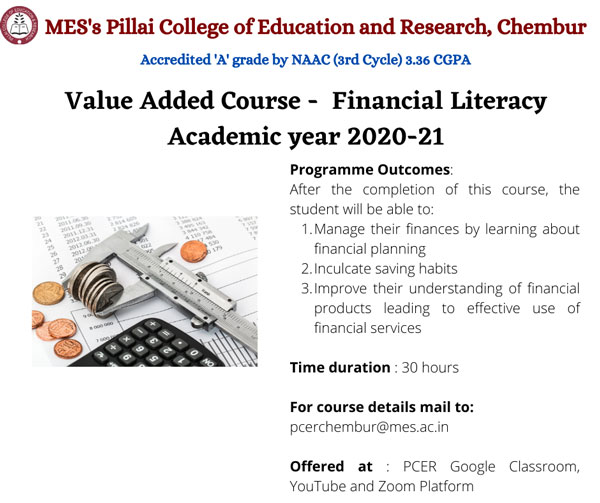
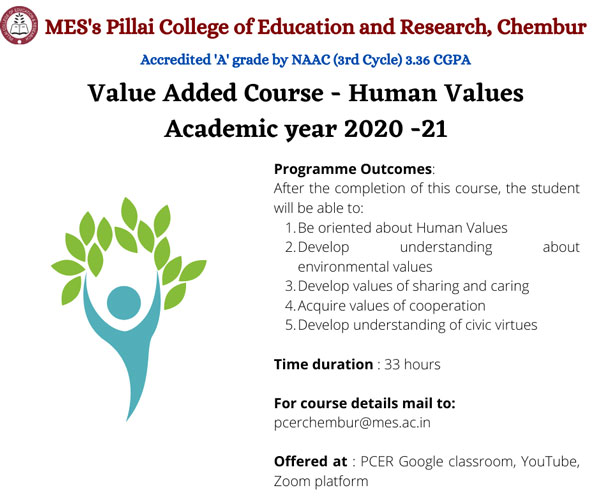
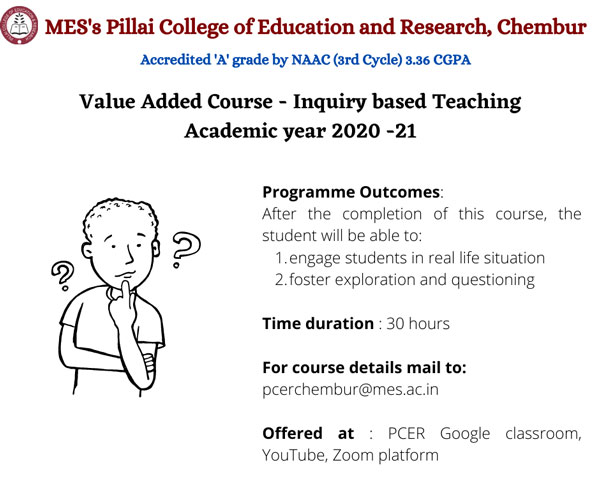
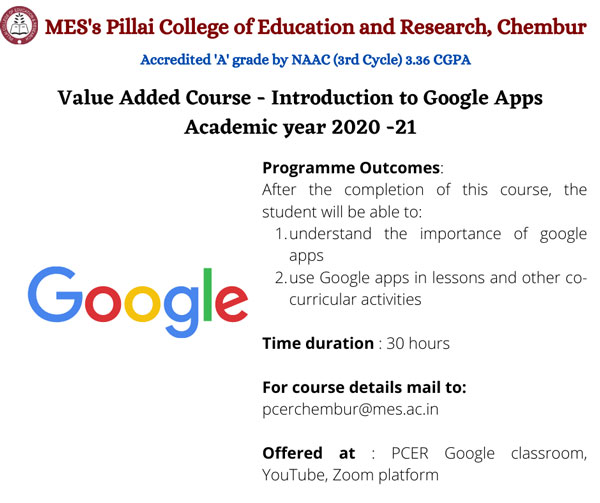
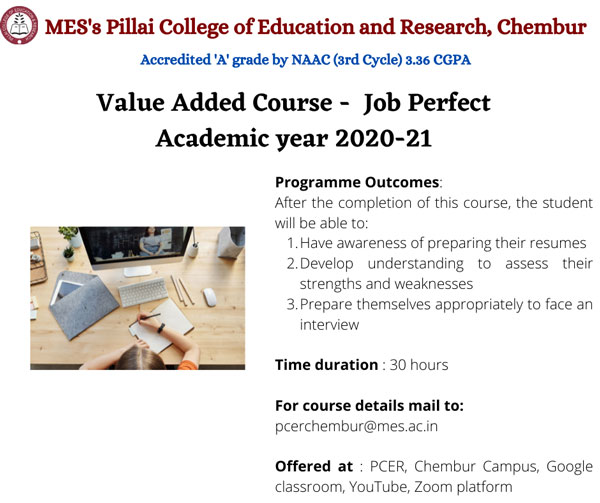
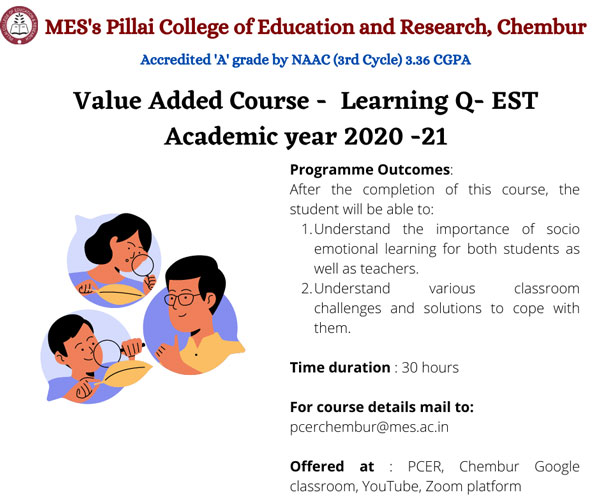
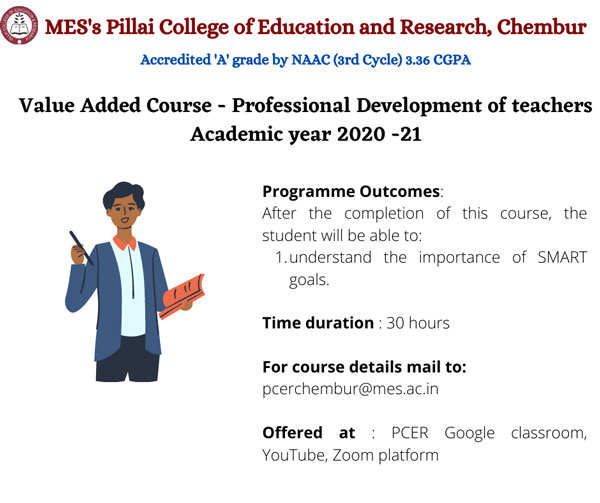
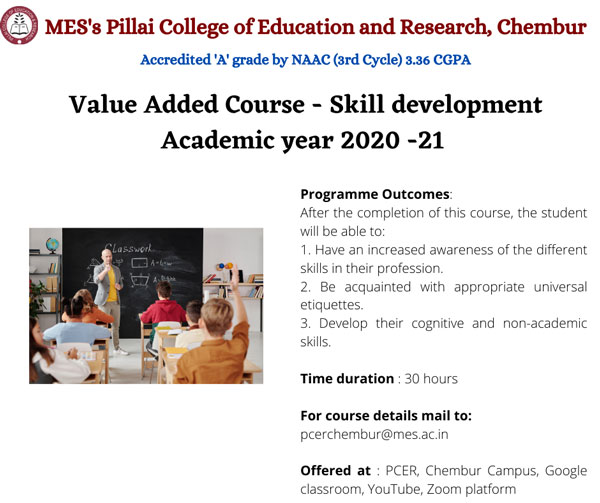
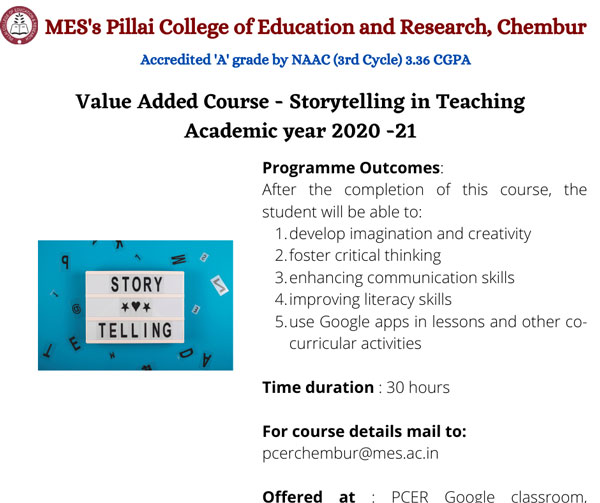
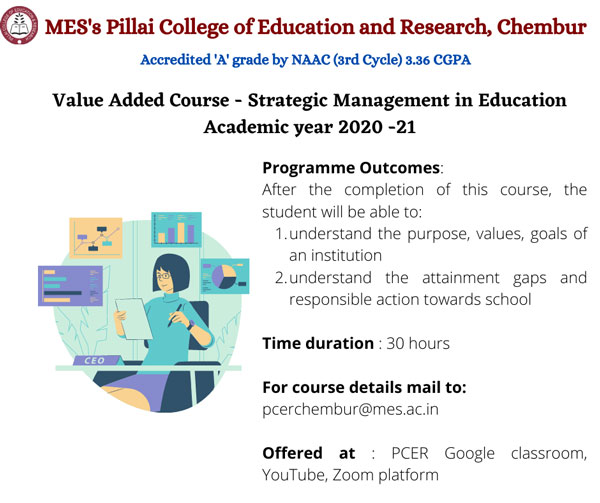
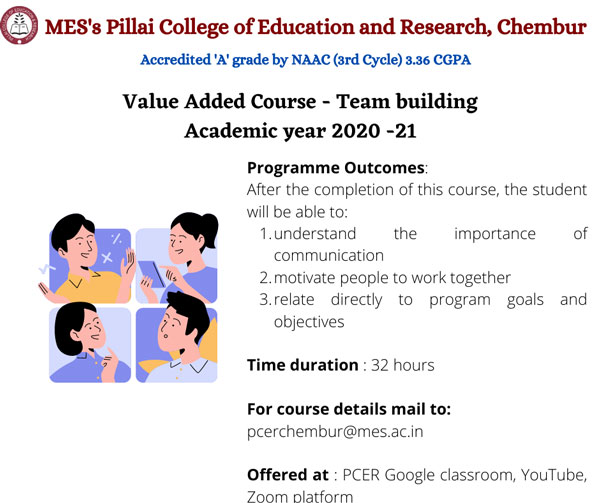
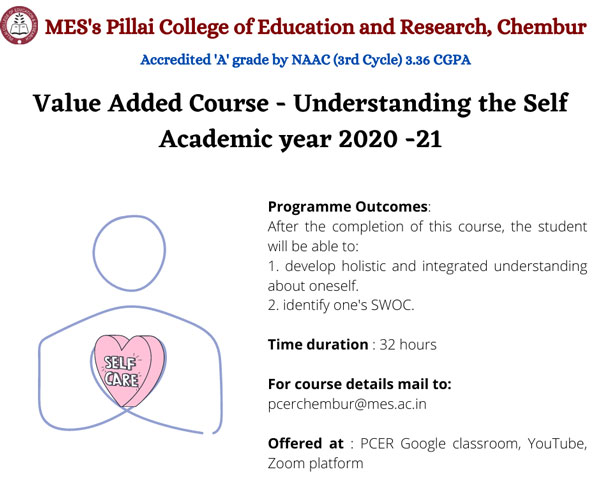
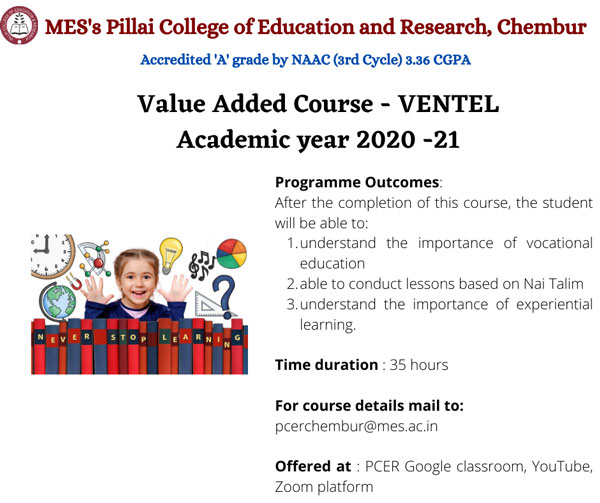
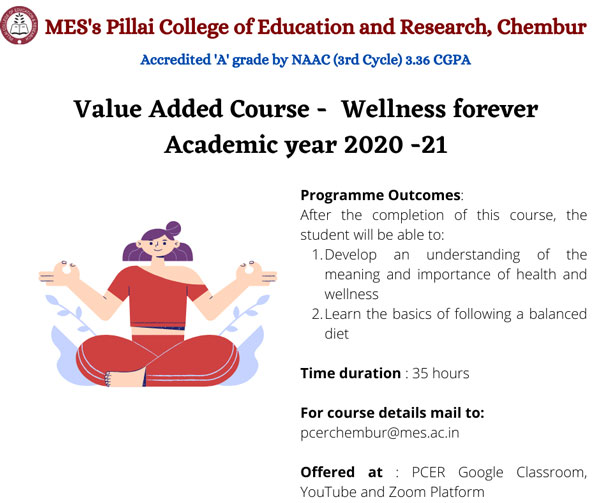
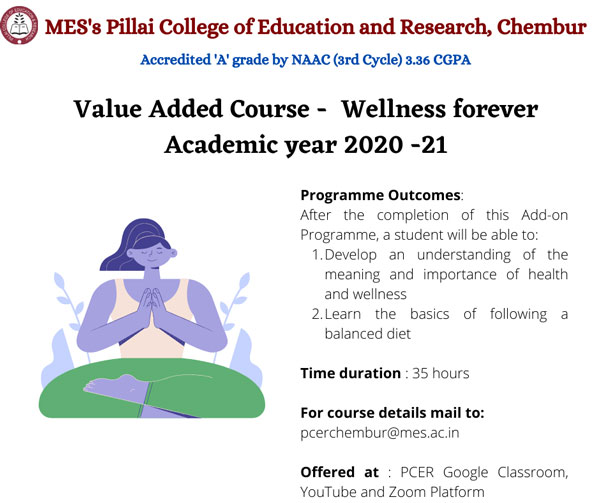
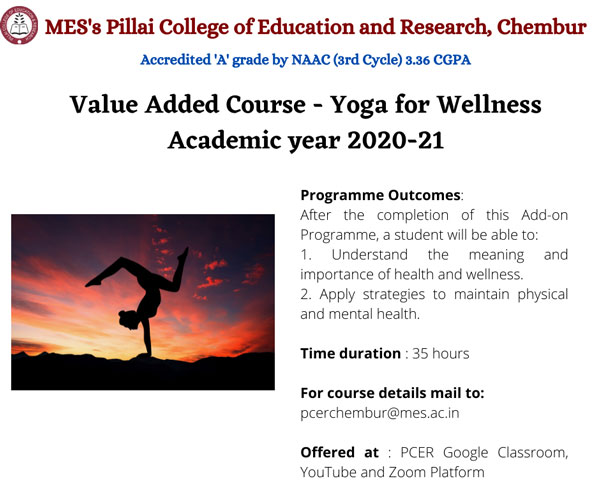
PCER Chembur in collaboration with Youth Peace Foundation and University of Mumbai, Thane Sub-Campus, Pandita Ramabai Girls Hostel organised an online add on course – The Prem Rawat Foundation’s Peace Education Programme. The course was conducted by the team members of Youth Peace Foundation in India.
The Peace Education Programme enables the participants to bring positivity in their lives through understanding their inner selves towards achieving peace. The course was held from 1st to 11th February, 2021 and consisted of 10 sessions conducted via Zoom meetings from 6.00 p.m. – 7.00 p.m.
Certificates were provided on completion of the course. This course was in alignment with SDG 16: Peace, Justice and Strong Institutions.
The Zoom Meeting ID: 824 2839 1421
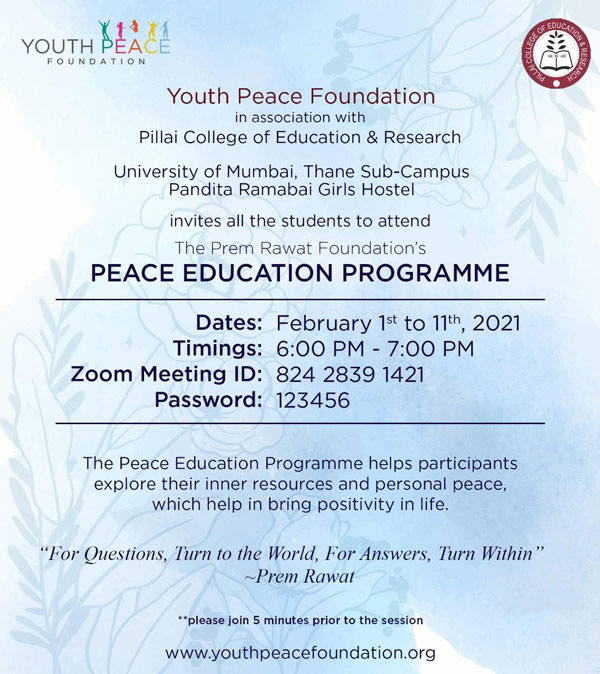
PCER conducted a short-term course in Environmental Sustainability from 10th to 18 September, 2020 through google classroom. The objective of this course was to create an awareness among student teachers about the need and importance of environmental sustainability. Some of the topics covered in the course include structural and functional organization of ecosystem, Indian Constitution and Environment, meeting climate change challenges, ecological footprint and leading towards sustainable development.
The course work consisted of online lectures, videos, supporting material and assignments. The content was delivered as six modules each module related to topics enriching the students about sustainable development.
Objectives of the Course:
Module 1-Introduction to Environment
The first module covered the topic of Introduction to Environment. In this module students were presented with examples of different ecosystems in the biosphere. This module made the students competent to analyse the different real-world situations where biotic and abiotic factors influence each other.
Module 2- Importance of biodiversity in ecological functioning
In the second module, the importance of biodiversity in ecological functioning was discussed. The class discussed topics like functional dynamism of ecosystems, ecological pyramids, impact of changes to trophic levels etc. The students analysed the importance of biodiversity, threats to biodiversity and predicted possible ways to protect biodiversity.
Module 3-Biodiversity and Climate Change
The third module dealt with biodiversity and climate change. The topics covered included climate change, factors responsible for climate change and its possible outcomes on biodiversity.
Module 4-Solid Waste Management
In the fourth module the focus was given to solid waste management and its importance in ensuring sustainable development. The students discussed the videos which showed the issue of garbage disposal. The students also gave insight into various strategies involved in dealing with different types of waste .
Module 5- Indian Constitution and Environment
The fifth module dealt with the provisions in Indian Constitution with respect to the environment. The students were presented reading materials which helped them to analyse how Indian Government has come up with a strong legislation in the various environmental issues. The various Acts related to Environment in the Constitution were discussed in detail.
Module 6- Ecological Footprint
The sixth module dealt with ecological footprint. It discussed the concept of ecological footprint, factors leading to greater carbon footprints, its impact on life ways to reduce carbon footprint, carbon footprint etc. Students suggested measures to be taken at personal, societal and organizational level to reduce the carbon footprint.
The short-term course in Environmental Sustainability helped to create an awareness in student teachers about the need for sustainable development, and ways to achieve the same.
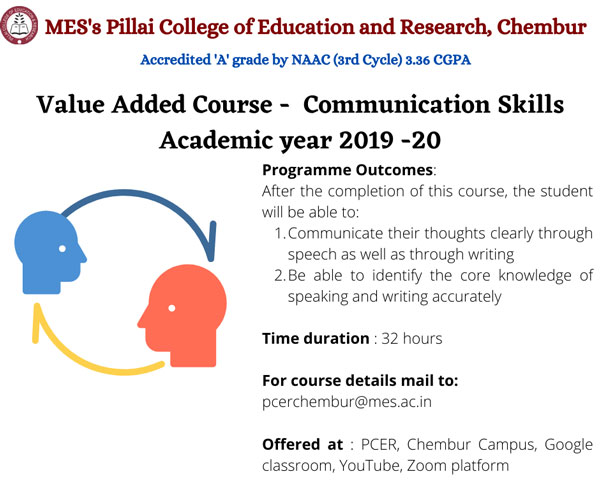
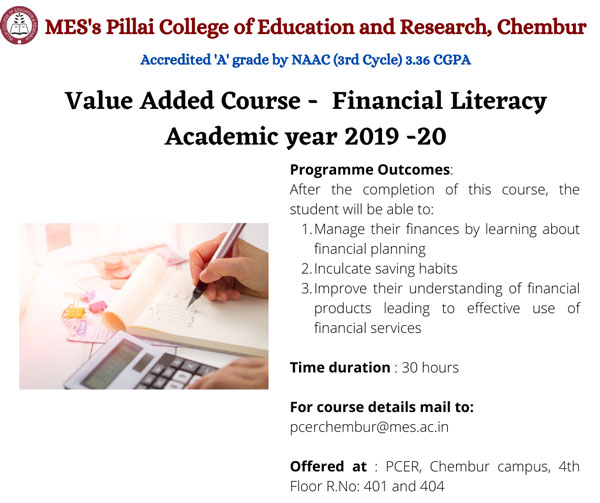
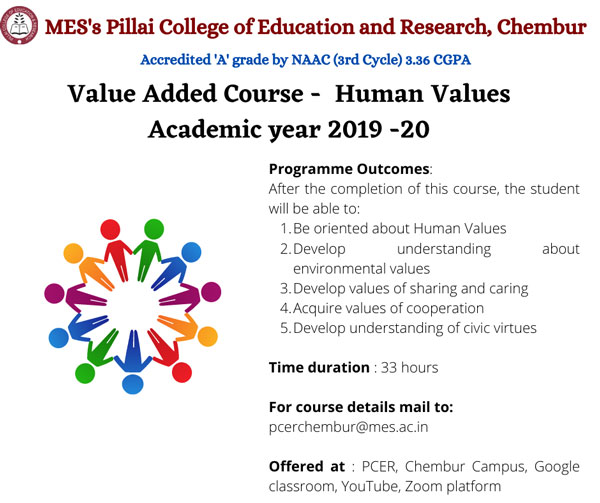
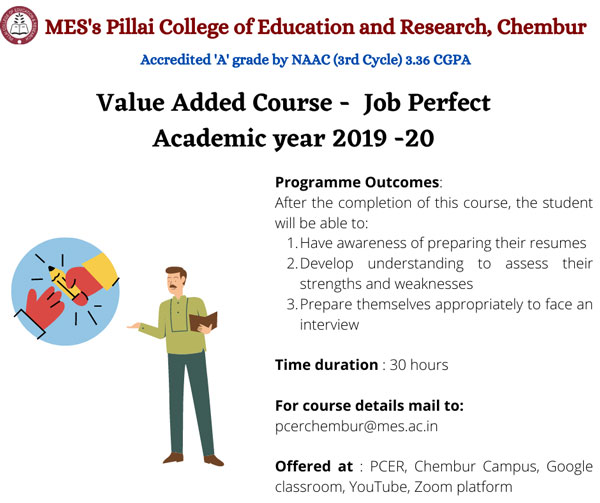
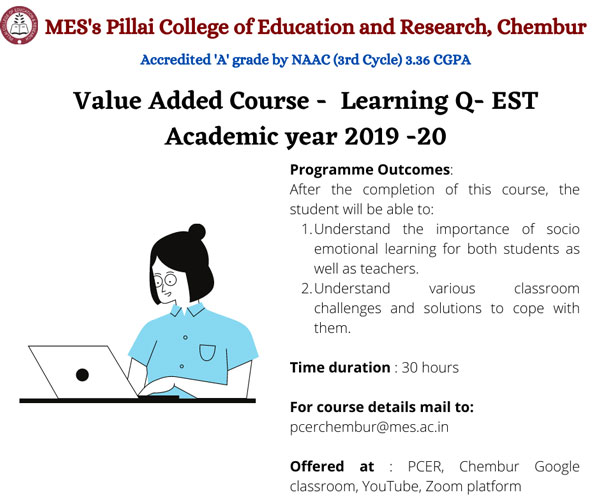
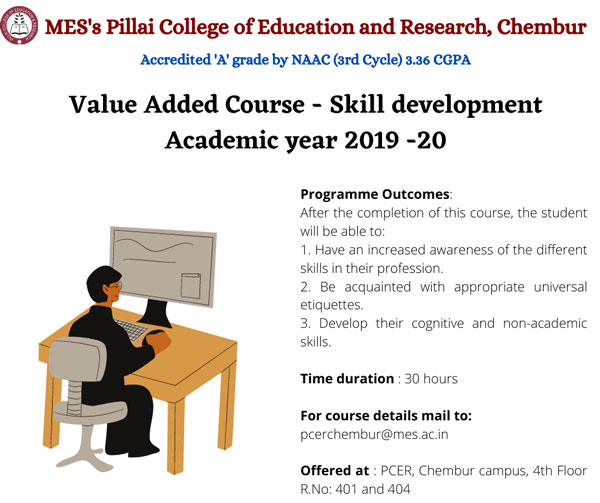
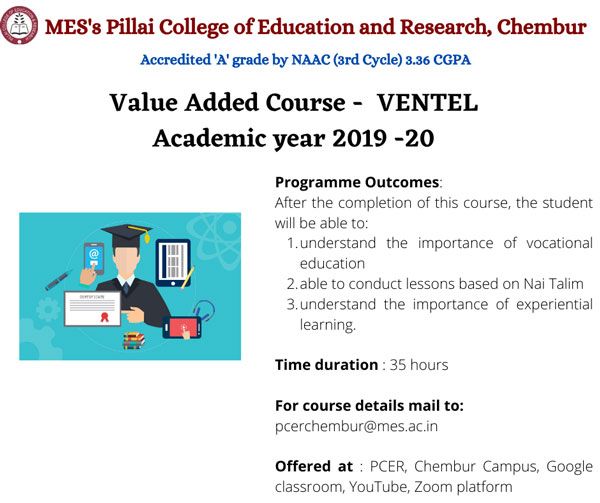
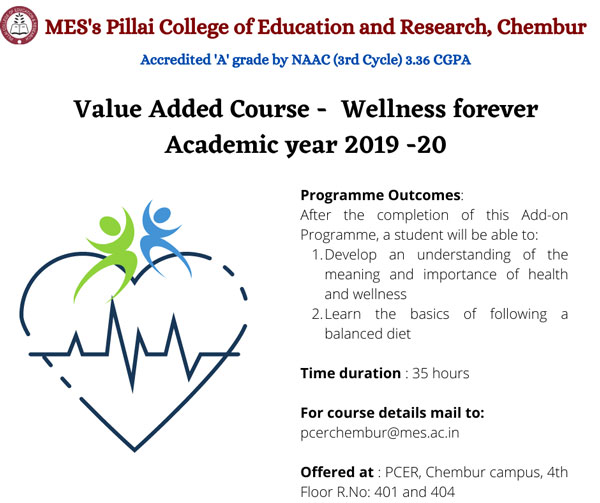
On the 4th, 5th and 6th May, 2020, The Alumni Association of PCER, Chembur in collaboration with PCER, Chembur reached out to the students and alumni via a three-day value-added course organised and delivered by the alumni themselves.
The three-day course focussed on the three quotients that are needed for any teacher, viz. the Emotional Quotient (EQ), the Social Quotient (SQ) and the overall Teacher Quotient (TQ).
The resource persons were our own alumni Ms. Priti Roy from the Batch of 2014-15, now an NLP practitioner and a POSH and POCSO enabler spoke on EQ and elaborated how necessary it is for a teacher to be aware of his / her own emotions and then pass on the same skill to each child she teaches.
Ms. Sneha Shah from the Batch of 2014-15, a Senior Faculty & Content Writer at College pond Education Pvt. Limited spoke about on how a teacher may develop her SQ as the school is a miniature society children should learn the skill to live well in a society.
Ms. Parveen Shaikh, from the Batch of 2013-14 and the Principal of The Somaiya School, Ghatkopar collated all the skills together and spoke about the need and strategies for a teacher to connect with her students.
PCER, Chembur was proud to host it on its YouTube channel and you can view these on the following links.
Emotional Quotient – Ms. Priti Roy: https://www.youtube.com/watch?v=0Rb8oSgYY0Q&t=1579s
Social Quotient – Ms. Sneha Shah: https://www.youtube.com/watch?v=yIVjuOtJRi4&t=1390s
Teacher Quotient – Ms. Parveen Shaikh: https://www.youtube.com/watch?v=nhFLj0Iqy8k&t=94s
Job Perfect – Grooming Session
Day & Date: Saturday, 19th October, 2019
Venue: Room 401, MES’s Chembur Campus
Topic: CV Writing
Timings: 11:30 am to 12:00 noon
Resource Person: Dr. Swasti Dhar
This was an advanced session which helped the students to make fine changes in their CV keeping specific companies in mind.
Some of the specific points which were discussed were:
Topic: Language Enhancement and Social Graces
Timings: 12:00 p.m. – 1:30 p.m.
Resource Person: Ms. Jaya Cherian
A vital aspect that every candidate needs to prepare themselves with respect to job interviews is language and social skills. The student teachers were provided an orientation on enhancing their language and social graces. Some of the aspects covered with regard to language enhancement included the following:
The session also highlighted the importance of social graces to be observed with respect to various areas of social interactions including the following:
The session concluded with a discussion on the various queries raised by the student teachers. It was a very interesting and interactive session overall.
Session on Career Guidance
On 4th April, 2020, 94 students of the S.Y. B. Ed. assembled via a Google meet Session on how they should prepare themselves for the same. The resource person was Dr. Swasti Dhar who focused how the various questions that the students should focus on so that they are well equipped to take up newer responsibilities. The Meet answered questions regarding options for further studies, skills which could be developed and how to go about it.
Placement Fair – 2020
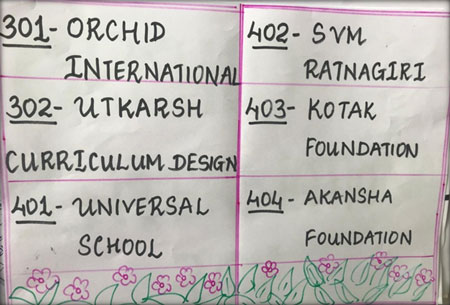
Date: 4th January, 2020
Time: 2:00 p.m. – 5:00 p.m.
Venue: Chembur Campus (Room No. 301, 302, 401, 402, 403 and 404)
PCER, Chembur conducted its first round of Campus Interviews for the batch 2018-20, second years, successfully on Saturday, 4th January, 2020.
The following five schools representatives had come to orient and interview the student teachers.
Schools submitted their criteria of appointment and fee structure beforehand. So our students were well versed with the schools and based on their preferences attended the interviews. The Placement Cell of PCER had conducted lot of workshops both theoretically and practically regarding facing interviews. So our students were confident while presenting themselves before the interviewer.
Feedback was taken from the interviewers regarding the following criteria:
Though it was their first experience, the interviewers marked them as good and very good.
Workshop on Resume Writing 2019-20
Date: 25th June, 2019
Venue: Room 401
Time: 12:00 pm to 1:15 pm
Resource Person: Dr. Swasti Dhar
Objectives of the workshop
The Presentation
On the 25th of June, 2019, the Career Cell of PCER organised a workshop on Resume Writing for the students of S.Y. B. Ed. that is, the Batch of 2018-20, Semester III students. The workshop was conducted by Dr. Swasti Dhar.
The purpose of a Resume is to ensure that a person is selected for an interview call. The students were introduced to the concept of a Resume and how it differs from a CV. They learnt that a complete Resume includes a CV as well as a Covering Letter. They were also learnt the format of a typical resume which is used by in the teaching profession.
There are some basic questions that one needs to ponder over before one sits to pen down one’s Resume. These are not only broad questions regarding what kind of a school/ job one wishes to engage with and narrower ones such as what are one’s expectations regarding salary, work timings, non-academic duties which one will be willing to take up.
One needs to reflect deeply on what the schools (to which they will be applying) want from them and what are the strengths and positive qualities that they bring to the table and pen it down to fit all the relevant details into one to two pages.One has to ensure that they present a positive picture of themselves so that their resume is selected for an interview call.
The session was interactive and supplemented by a powerpoint presentation.
Dr. Swasti Dhar explains a few points during the Workshop
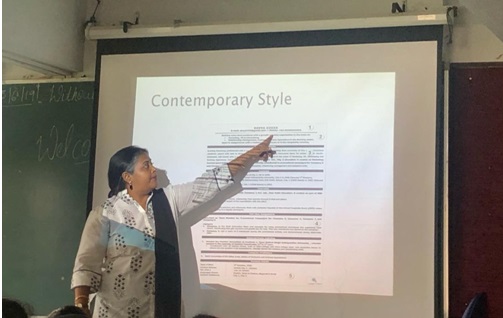
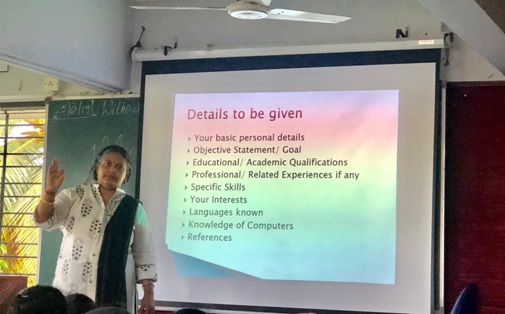
PCER Chembur initiated a 30-hour training programme on Well being by introducing a course on Yoga & Wellness.
The initiation of the add-on course was held on 21st June, 2019. The theme for the celebration of Yoga Day was ‘Listen to your Body’ and professional yoga trainers – Mr. Sadashiv Kashinath and Mr. Farheed – were invited to conduct the session.
They started with explaining the importance of yoga and meditation and then detailed how one must approach the upcoming sessions.
Objective of the Add-on Course
How the Programme was conducted
The training Programme was covered over 3 months June to October 2019 and was conducted through 45 minutes of yoga training every Monday, Wednesday and Saturdays from 10:30 am to 11:15 am.
Teachers today are primarily facilitators of meaningful teaching learning experiences for learners. In order to provide effective learning experiences teachers require sound knowledge of content, teaching skills, technological skills and innovative teaching methods. In the process of transacting the curricular learning experiences it is also vital that they instill in their learners a sound value system that will lead to the wholesome development of the learner. Environmental degradation due to human activities are a pressing concern today and teachers need to acquire such a value system that incorporates this concern so that they can instill the same values in their learners. In alignment with the vision and mission of PCER and its motto of sustainable development the institution organized an add on course for student teachers from 28th November, 2019 on Human Values towards Sustainable Development Goals.
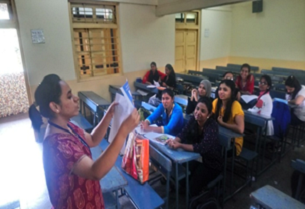
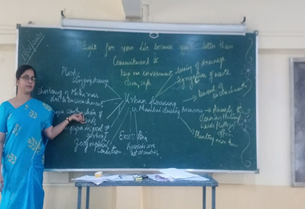
Objectives:
The following human values were focused on in the sessions:
Commitment towards Environmental Protection
During the session the student teachers analysed different natural calamities that have occurred recently in India. They were involved in discussion, cause effect analysis, probable solutions and mind mapping. They also suggested activities that upheld the value of commitment to environmental protection.
Sharing and Caring
The sessions focused on man-animal conflict which has increased in recent times. Through analysis of newspaper articles the student teachers looked at the cause and effect of each situation. Through a think-pair-share and spray diagram the student teachers were made aware of the need to have a sharing and caring nature towards the environment.
Co-operation
The value of cooperation is one of the most important values which can lead to sustainability of the environment. The students worked in pairs to find out the extent of the different relationships that exist in the natural world. The students were able to understand that there exist relationships among animals beyond that of predator and prey and these were essential for maintaining ecological balance.
Civic virtues
The value of civic virtues is of great significance as it helps individuals to identify their ecological role and their responsibilities towards society. The session included case studies of environmentally beneficial activities and preparation of iceberg models by the student teachers. This session reflected upon the change that must be brought in the mental model in order to develop civic virtues
A wholistic development of a wide range of skills is essential for a teacher to for successful transactions of teaching learning experiences. PCER recognizes the need for student teachers to equip themselves with various skill sets to enable them to carry out their tasks effectively and with confidence.
PCER organized an add on course that commenced from 27th June,2019– Skill Development Programme – to develop certain skills among the student teachers and enhance their personalities.
Objectives:
The course covered broadly the following areas:
The various sessions conducted included:
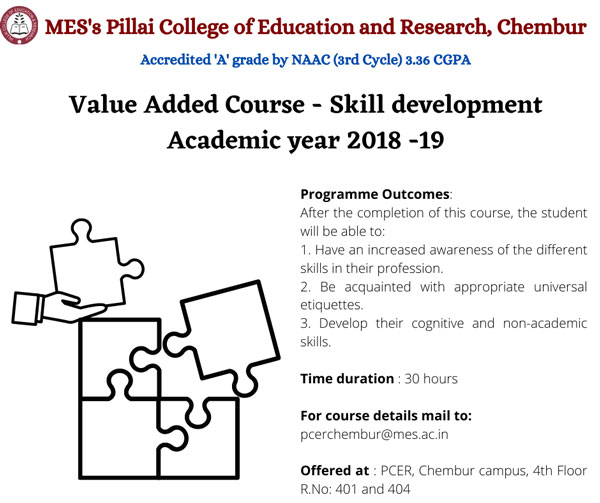
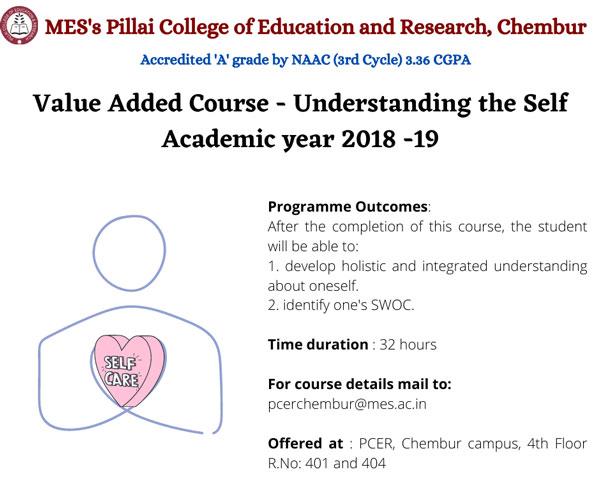
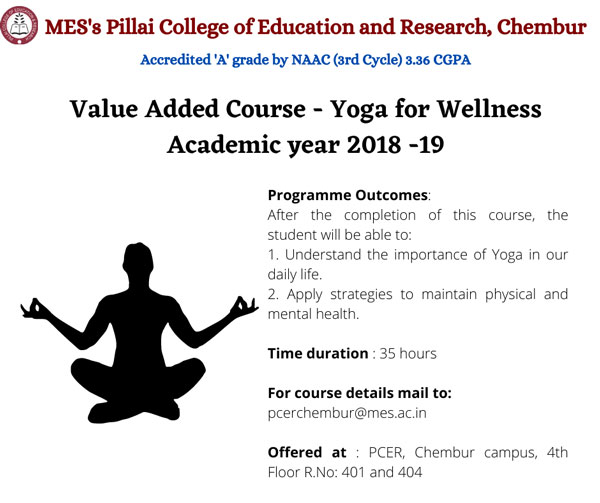
The effective teacher needs to cultivate a variety of skills for conducting her tasks and responsibilities successfully. A teacher needs to have several skills along with the basic teaching skills in order to have a positive impact as an individual and as teacher. PCER organized an add on course that commenced from 10th July, 2018 – Skill Development Programme – to enhance certain skills among the student teachers and enhance their Personalities.
The course covered broadly the following areas:
The various sessions conducted included:
Activity Conducted:
The practical sessions for the year 2018-19 focussed mainly on:
Revising:
New Knowledge:
Challenges:
Each support staff have different pace of learning. They have individual differences and vary in their learning styles too. So teacher educators had to keep lot of patience to teach them. They have to also be motivated time and again as they easily loose interest.
Outcome:
Support staff started typing their name and address on their own. Save the file. Open it next time to add other personal information. This continued throughout the year and they all could start writing and saving it successfully.
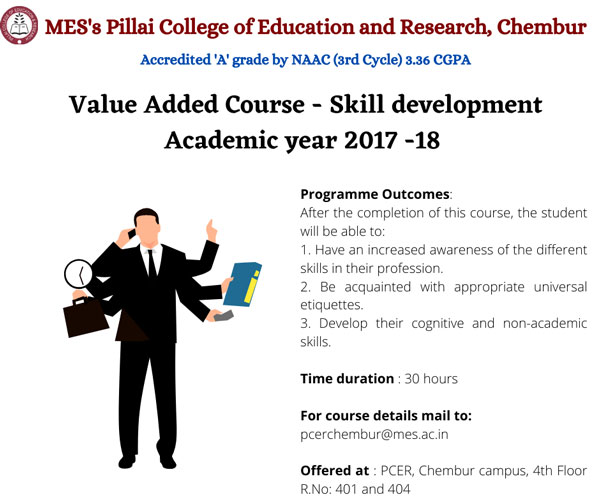
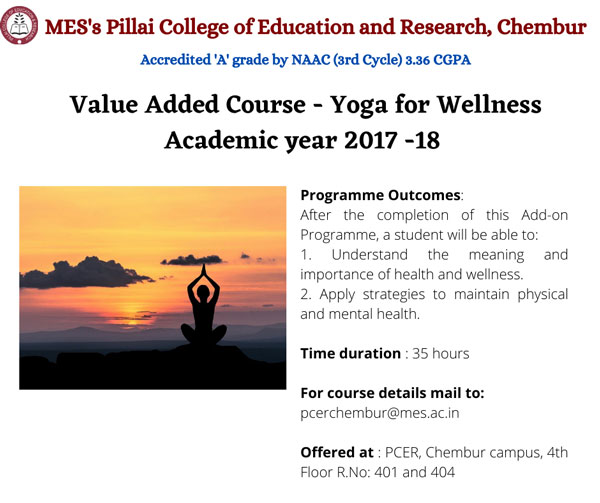
A teacher does not only teach but also touches the soul of the future generation. A teacher is a model whom the students emulate. A teacher needs to acquire various skills to be efficient and effective in her profession.
Behind every successful goal achievement is proper skill development. PCER organizes the Skill Development Programme to enhance the hidden skills among the student participants and hone their innate abilities.
Each module will be spread over 5 hours. The entire Programme will be conducted over duration of 20 hours.
The sessions include:
Need Felt:
Computer Literacy has become a basic necessity in today’s world. Whether you are young or old, it is imperative to know the basic functioning of computer. The support staffs of our college works in tandem with the other staff for imparting quality education among our student teachers. But we realised that they are very ignorant about computer functioning. They feel that it is beyond their understanding.
Activity Conducted:
So the college staff took an initiative to break the ice and start with regular sessions with the support staff. The first few sessions were mainly theoretical because it is important that they feel the urge to learn.
The practical sessions for the year 2017-18 focussed mainly on:
Challenges:
It’s true that only when you do, you realise the difficulties faced. We never expected that all of us are so time bound that taking out even half an hour together, once a week was becoming difficult. But again the saying is that determination overcomes all challenges, and we did it!
The teaching and the support staff started fixing up their schedule for basic instructions and practice the above mentioned tasks on regular basis.
Outcome:
There was a sense of confidence and motivation among our support staff and they thoroughly enjoyed and gained a lot through this program.
Value Added Courses
Outcome: To bridge the gap between the academic and industry need.
It is important for higher education institutions to supplement the curriculum to make students be better prepared to meet industry demands as well as develop their own interests and aptitudes. The college organizes special training sessions to help the students with developing some critical skills like group discussions, better communication skills, presentation skills, interview skills, writing skills and so on. This will help the students develop confidence and become better equipped to face the challenges.
| Value Added courses | Outcomes |
|---|---|
| Financial Literacy | To enhance academic skills |
| Learning Q-EST | To enhance academic skills |
| Human Rights | To enhance academic skills |
| Peace Education | To enhance academic skills |
| Communication skills | To enhance employability |
| Job Perfect | To enhance employability |
| Introduction to Google Apps | To enhance employability |
| Professional Development of Teachers | To enhance employability |
| Behaviour Management | To enhance employability |
| Drama in Teaching | To enhance employability |
| Story telling in teaching | To enhance employability |
| Inquiry based teaching | To enhance employability |
| Digital skills in classroom | To enhance employability |
| Personality Development | To enhance employability |
| Skill Development | To enhance employability |
| Leadership | To enhance Entrepreneurship |
| Team Building | To enhance Entrepreneurship |
| Strategic Management | To enhance Entrepreneurship |
| Human Values | To address Local and global needs |
| VENTEL | To address Local and global needs |
